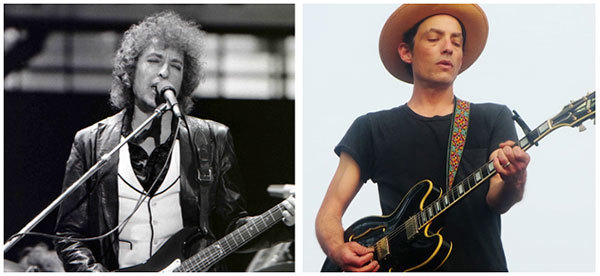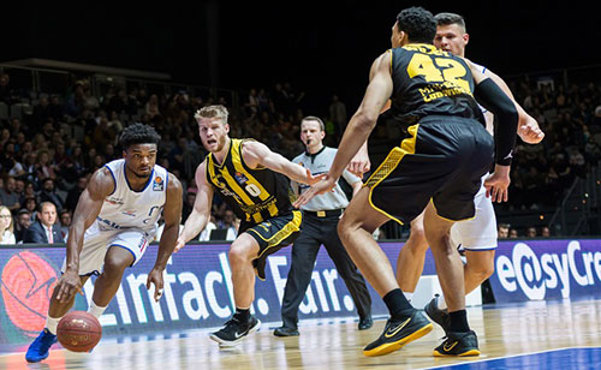
Can genetics determine talent?
February 15, 2005

- Related Topics:
- Complex traits,
- Environmental influence
A curious adult from Illinois asks:
“How much, or how little, of a role do genetics play in determining whether someone has mathematical, musical, artistic or athletic ability? Everyone in my husband’s immediate family has a tin ear; everyone in my family seems to have a talent for music. Do things like musicality or athleticism run in families because of nurture, or nature?”
Barry Bonds and his dad Bobby. Michael Douglas and his dad Kirk. Bob Dylan and his son Jakob. Great athletic ability, artistic talent, and musicality seem to run in families. But would any of these kids have done as well raised in a different family?
Maybe, maybe not. The answer to your question is that these guys probably needed both genetics and the environment to become so talented.
Without training and opportunities, artists and athletes such as these probably would not have much success. And without genetics, they would have had an even harder time.
You can think of genetics like the block of marble from which a statue is made. Michaelangelo could not have created his famous David statue from a piece of marble that was too small. The same is true for athletes.

For example, if you want to be a woman gymnast, being 6 feet tall would make things much harder. Period. And genetics are a big part of how tall you are.
Of course, the woman with the perfect gymnast physique who never receives training or doesn’t know what opportunities are out there probably won't make it either. This is like giving the perfect piece of marble to me and asking for a David. Not going to happen.
None of this says that genetics is everything. 5'3" Muggsy Bogues did very well in basketball. Of course, the genetics that gave him quick speed and great leaping ability did come into play.
So nature and nurture are both involved. But do we know anything specific about which is more important? Or what genes are involved?

Music and perfect pitch
There have been some interesting studies with musicality. More specifically, with a trait called perfect pitch.
Perfect pitch can be a great trait if you’re a musician; it gives you the ability to identify any musical note. Research suggests that this trait may depend on genes (“nature”) and a young exposure to music (“nurture”).
My friend Kate is a talented musician who has been playing piano since she was 4 years old. She also happens to have perfect pitch. It turns out that nearly half of musicians who started music before age four end up with perfect pitch. However, starting music after age 9 decreases your chance of having perfect pitch to 3 percent.1
What about genes, or the “nature” aspect to perfect pitch? Well, a person with this trait is four times more likely to have a family member with perfect pitch compared to the general population. Of course this isn’t necessarily proof that genes are involved.
It may be that an interest in music combined with early music experience leads to perfect pitch. If there is a gene, scientists will find it – they are actively looking right now.
Other evidence that genes might be involved in perfect pitch comes from looking at certain genetic conditions. For example, people with conditions like autism and Williams syndrome often have perfect pitch and great musical talent, though they may struggle with other subjects such as math. Why or how this happens is unclear.

Athletic ability
What about athleticism? Do we have any evidence for genes involved in becoming an athlete?
One gene that for sure has a dramatic effect on muscles is called myostatin. In rodents, little “mighty mice'” have been produced that lack the gene for myostatin. These mice are like little bodybuilders, with twice the muscle mass of normal mice!2
At least one super-muscular human child is also known to lack this gene. I wouldn't want to be the kid playing against him at the school football game!
In athletics, though, it seems like nurture is also extremely important. Think about all the athletes who have overcome incredible misfortune to succeed.
Lance Armstrong has won five Tour de France titles after battling cancer. A few years ago, Erik Weihenmayer became the first blind person to climb Mt. Everest. There are several famous athletes who compete with diabetes.
These folks have more than just athletic talent; they have strong mental will power. And who knows what controls that! In the end, the age old argument about nature vs. nurture is ongoing. We still do not know exactly how we became the way we are. So encourage your husband and your young children especially, to keep on jamming to the music!

Author: Dr. Karen Fitch
When this answer was published in 2015, Karen was a postdoctoral fellow in the Department of Genetics, studying the genetics of mouse skin development and pigmentation in Greg Barsh’s laboratory. Karen wrote this answer while participating in the Stanford at The Tech program.
 Skip Navigation
Skip Navigation
